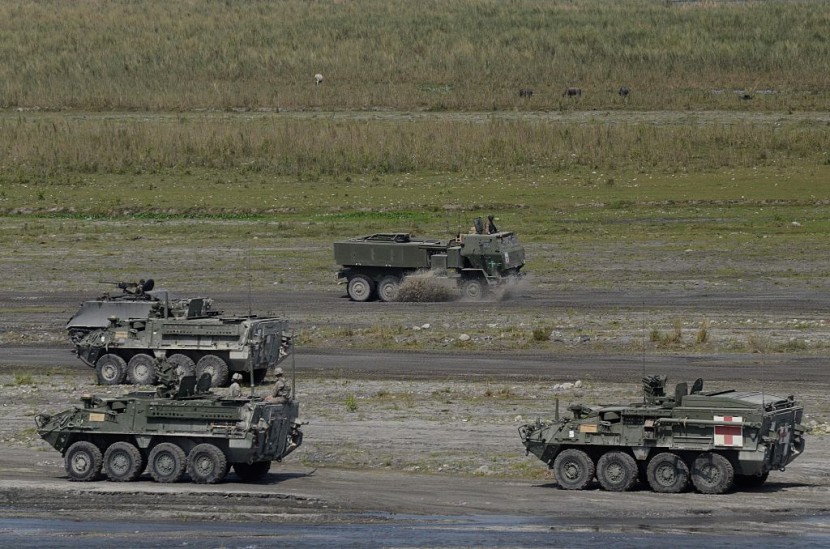
- The Philippines confirmed the locations of four new US military bases
- The new bases have enraged Chinese officials
- The locations will provide a staging area for US soldiers close to southern China and Taiwan
The Philippines announced the locations of four new military outposts that the United States will have access to as part of an extended defense cooperation geared at countering China.
Three of the sites are located on the main island of Luzon, near Taiwan, while one is in the South China Sea province of Palawan (SCS). In recent months, the United States has intensified its attempts to broaden its Indo-Pacific security options in response to growing worries regarding China's aggressive territorial posturing.
Philippines Gives US Access to Military Sites
The US will be able to rotate troops to nine sites in the Philippines, including the strategically significant Balabac Island, close to Chinese installations in the South China Sea, as a result of the 2014 Enhanced Defense Cooperation Agreement (EDCA).
The announcement of the location follows a flurry of high-profile US military agreements throughout the area, including pledges to share defense technologies with India and to deploy new US Marine battalions to the islands of Japan.
Earlier this year, the United States Marine Corps opened a new base on Guam, a strategically significant island east of the Philippines. Per CNN, camp Blaz is the first new Marine post in seventy years and could eventually house up to 5,000 Marines.
Philippine President Ferdinand Marcos Jr. announced his acceptance of extending the US military presence in the Philippines to four new military bases by the 2014 EDCA between the longstanding treaty allies.
Marcos stated that the move would strengthen coastal defenses in the Philippines. It aligns with US President Joe Biden's attempts to establish an arc of military alliances in the Indo-Pacific to resist China more effectively, including any future conflict over Taiwan.
The new sites selected by Marcos' office include a Filipino navy facility in Santa Ana and an international airport in Lal-lo, both of which are located in the northern Cagayan region. These places would offer US soldiers a staging area near southern China and Taiwan, the self-governed island Beijing claims as its own, according to ABC News.
The two other military sites are a navy camp on Balabac island in Palawan's western province and Isabela's northern province. Palawan confronts the South China Sea, a crucial passageway for global trade that Beijing claims nearly in its whole and has threatened smaller claimant states, like the Philippines, with increasingly aggressive tactics.
China, the Philippines, Vietnam, Malaysia, Brunei, and Taiwan are embroiled in escalating territorial conflicts over the resource-rich and busy South China Sea. Beijing is angered by Washington's deployment of warships, fighter aircraft, and spy aircraft for patrols, which it claims enhanced freedom of navigation and the rule of law.
This is a trade corridor over which approximately $3 trillion worth of merchandise flows. The chairman of the Philippine Defense Department, Carlito Galvez, stated that collectively securing this is a major duty. Marcos's office states that the four new military bases for US personnel are "appropriate and mutually beneficial."
Experts Warn Repercussions
In a meeting with Philippine officials in Manila last month, however, a Chinese Foreign Ministry delegation voiced its opposition to an expanded US military presence in the Philippines. According to a Philippine official involved in the talks, it warned of repercussions for regional peace and stability.
Meanwhile, experts have stated that the Philippines should remain impartial or risk being "crushed" by the ongoing Sino-US competition while pushing Manila to collaborate with Beijing to handle tensions in the South China Sea.
On Monday, during a three-hour media forum hosted by the Manila-based Integrated Development Studies Institute (IDSI) and supported by other think tanks such as the South China Sea Probing Initiative (SCSPI), five international relations experts discussed managing China-Philippine relations in light of the "great power conflict" between Beijing and Washington.
Professor Hu Bo, head of the South China Sea Policy Institute (SCSPI) and the Center for Maritime Strategic Studies at Peking University, observed that a portion of the US-China confrontation was taking place in the South China Sea.
Per SCMP, Hu stated during the conversation that tensions in the South China Sea would grow if a coastal state such as the Philippines, which is "not a direct party" to this war, took sides. Manila announced on Monday that the United States would have access to four more locations under the Enhanced Defence Cooperation Agreement, which aims to strengthen military ties between the two nations.
Related Article: Philippines: Police Bust $74 Million Worth of Drugs
@YouTube








